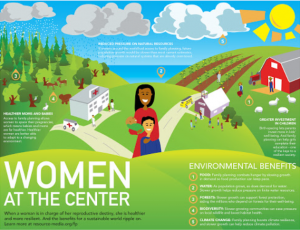With One Push, Lifting our Mothers and our Mother Earth
By Emma Andersson
 About a month ago, I stumbled upon a free book bin at a garage sale. Rummaging through the assorted titles, one blue hardcover with big yellow letters caught my eye. It read: The Moment of Lift: How Empowering Women Changes the World by Melinda Gates.
About a month ago, I stumbled upon a free book bin at a garage sale. Rummaging through the assorted titles, one blue hardcover with big yellow letters caught my eye. It read: The Moment of Lift: How Empowering Women Changes the World by Melinda Gates.
I started to read as soon as I sat down and immediately found myself hooked on Gates’s writing, a collection of reflections on her experiences with women worldwide, both within her personal life and through her professional work. Detailing the work of the Gates Foundation to improve family planning in developing countries, its profound impact on women and their communities struck me.
Inspired to reflect on my own experiences, I quickly realized that sexual autonomy and empowerment, elements that women around the world fight for, are experiences I take for granted. While my doctor prescribed the Pill at my first request, only 43% of the world’s reproductive aged couples use modern and safe contraception.1Girls around the world are forced to cut their education short due to early pregnancy, a reality I had never considered.
Gates’s account opened my eyes to the fact that the consequences of early and frequent childbirth extend beyond the individual, touching families, communities, and whole countries. Motivated to delve deeper into the impacts of family planning, my investigation quickly revealed that efforts to improve family planning have further proved beneficial to the environment.
Discernment of this connection introduced me to the emerging field of Integrated Population, Health, and Environment Planning. Founded on the principle that nature and people are interconnected and that ecological changes disproportionately impact women and children, it identifies that “human communities and ecosystems best support each other when the needs of each are met in tandem”2, calling for cooperation between the women’s health and environmental sectors.
Study after study places girls’ education and family planning high on a list of solutions to save the planet, furthering the argument to integrate these two fields. Recognizing the victories of improved family planning requires an understanding of its impact on women’s health and its indirect impacts on the environment. By slowing and re-shaping population growth, family planning initiatives improve maternal and newborn health, support gender equality and female empowerment, reduce maternal and newborn death and undernutrition, and shape

Image above sourced from http://womenatthecenter.org/about/
economic development. Within the scope of environmentalism, it also eases pressure on local wildlife and ecosystems, reduces reliance on destructive environmental practices, and keeps carbon emissions in check.
From the environmental approach, climate change efforts help families adapt to the harsh consequences of global warming and reduce human suffering. Maintaining ecosystem health preserves agricultural systems that support women and their families and allows women to pursue other activities aside from the attainment of water, food, and fuel, creating the opportunity for continued education and income generation. Environmental practices also prevent the spread of infectious and bacterial disease, further contributing to women’s health, safety, and security.
It becomes impossible to ignore the existing overlap between the areas in need of improved reproductive health services and increased conservation efforts. This is no coincidence. Developing nations, due to high fertility rates, are ill-equipped to deal with natural disasters because population growth currently outpaces development efforts. It is because humans and the environment are interdependent that the communities most in need of change inhabit the places most in need of change. Acknowledging this, it is time to merge the actions of the women’s health and the environmental sector. Such coordinated efforts will truly move the needle on both fronts.
References
- Blanco C. Acceso al control de la natalidad: un estimativo mundial [Access to birth control: a world estimate]. Profamilia. 1988 Apr;4(12):17-24. Spanish. PMID: 12281360.
- https://thrivingtogether.global
Bio: Emma Andersson is a current undergraduate student at the Johns Hopkins University Krieger School of Arts and Sciences pursuing a dual International Studies-Sociology degree. A passionate learner, lover of nature, and an advocate for women’s rights, Emma is deeply interested in the intersection of women’s and environmental health.
